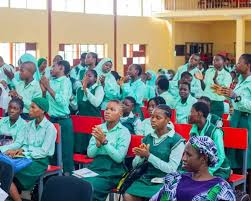In a bold move towards ensuring inclusive education for all, the National Commission for Almajiri and Out-of-School Children Education has announced plans to mop up 10,000 out-of-school children in the Federal Capital Territory (FCT) by September this year. This initiative, spearheaded by Dr. Muhammad Idris, the Executive Secretary of the commission, marks a significant step in addressing the challenges of out-of-school children in Nigeria.

The inauguration of the Out-of-School Children Marshals in Abuja signifies the commencement of a pivotal testing project that is set to expand nationwide. As part of the initial phase, the Marshals will embark on a rigorous search across the FCT to identify and register out-of-school children before the commencement of the new school year in September.
Dr. Idris emphasized the vital role of local leaders in this initiative, highlighting the importance of engaging Chiefs, Emirs, and District heads who possess a deep understanding of their communities. This approach aims to foster meaningful conversations with parents, encouraging them to recognize the numerous benefits of sending their children to school.
The collaborative effort between the National Commission for Almajiri and Out-of-School Children Education and local leaders reflects an acknowledgment of the fact that addressing the issue of out-of-school children requires a multi-faceted and community-driven approach. By leveraging the knowledge and influence of community leaders, the commission seeks to bridge the gap in access to education and create a supportive environment for children to thrive academically.
Professor Rukayat Tukur, the Head of the Marshals and Director of Grand Mobilisation, has assured thoroughness in the execution of this mission, underscoring the commitment to conducting the outreach with diligence and empathy. The assignment of thirty-one Marshals to the six area councils of the FCT demonstrates a strategic distribution of resources to maximize the impact of the initiative.
While primary education is officially free and compulsory in Nigeria, the staggering statistic provided by UNICEF that approximately 10.5 million children aged 5-14 years are not in school serves as a stark reminder of the existing educational disparities.
Furthermore, UNICEF’s report that only 61 percent of children between the ages of 6-11 regularly attend primary school, and a mere 35.6 percent of children aged 36-59 months receive early childhood education, underscores the urgent need to address this educational crisis.
In January 2024, the Federal government took a significant step by launching the National Campaign on Out-Of-School Children and distributing school materials to underserved children in Ilorin. Despite this proactive measure, the magnitude of the challenge demands sustained and concerted efforts at both national and grassroots levels.
The initiative to mop up 10,000 out-of-school children in the FCT represents a crucial stride towards enhancing educational inclusivity and equity. By prioritizing collaboration with local leaders and deploying dedicated marshals to engage communities, the National Commission for Almajiri and Out-of-School Children Education exemplifies a proactive and holistic approach to addressing the issue of out-of-school children.
As the testing project commences in Abuja, the impact of this initiative will be closely monitored as it sets the stage for potential nationwide expansion, subsequently contributing to the realization of a more inclusive and equitable education system across Nigeria.
In addressing the complexities of the issue, it is imperative to recognize the interconnected factors that contribute to the phenomenon of out-of-school children. These factors encompass socio-economic challenges, cultural norms, infrastructural deficiencies, and access barriers, among others. As such, a comprehensive approach that integrates targeted interventions, community engagement, and policy reforms is essential to effect meaningful change.
While the initiative to mop up out-of-school children in the FCT is undoubtedly commendable, sustaining the momentum and expanding the reach of similar initiatives to encompass other regions necessitates long-term commitment and robust partnerships.
Furthermore, alongside efforts to enroll out-of-school children, it is crucial to address the underlying systemic issues that hinder access to education, including poverty, gender disparities, and inadequate educational infrastructure.
The endeavor to mop up 10,000 out-of-school children in the FCT is a significant step towards creating a more inclusive and accessible education system in Nigeria. However, it represents just one facet of a larger, multifaceted challenge that requires sustained commitment, collaboration, and innovative solutions.
As the initiative unfolds, it is essential to remain proactive and adaptive, working in concert with communities, stakeholders, and policymakers, to effect enduring change and ensure that every child has the opportunity to access quality education.



